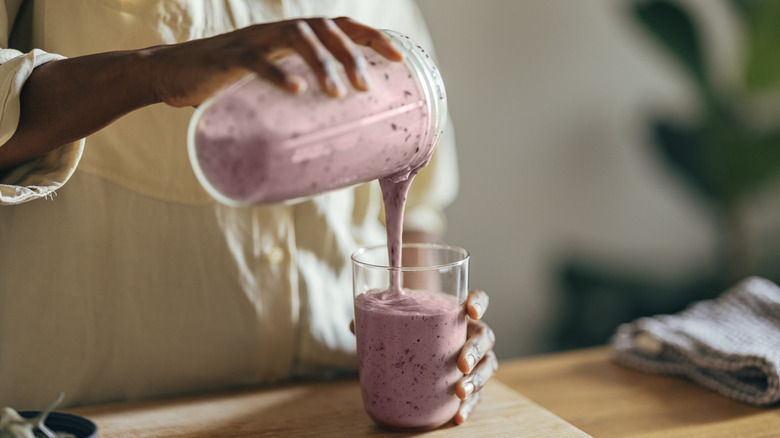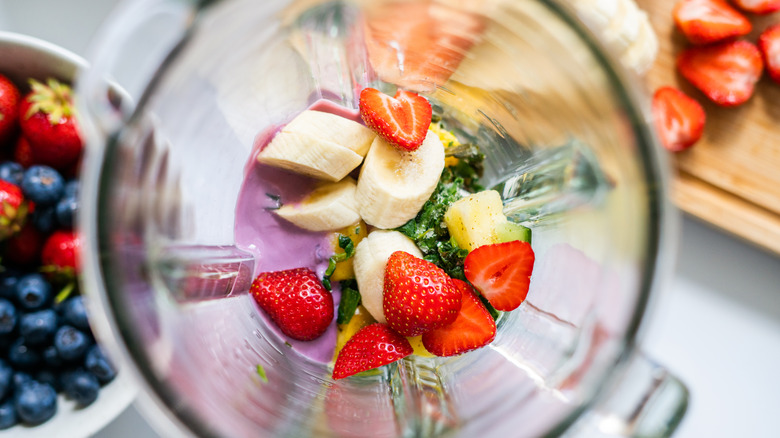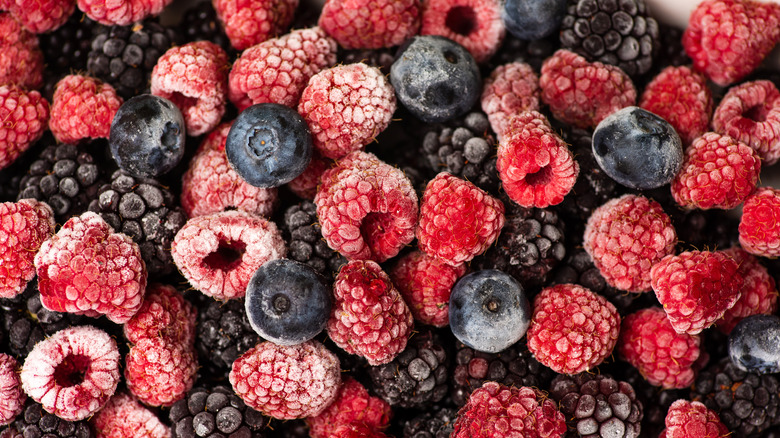The Reason You Should Avoid Canned Fruit For Smoothies
Behold: the smoothie. Whether it's breakfast or a midday snack, it's an easy and tasty way to get your daily servings of fruit. Just toss in some fruit, some kind of base liquid like juice or milk, then maybe some yogurt and some other plus-ups, from peanut butter to chia seeds; blend it all up; and you've basically got your smoothie. And with how many healthy smoothie recipes there are out there, it's understandable that they are a go-to.
But let no one tell you that all smoothie ingredients are created equal. Canned fruit, as one particular example, is a real no-no. Several health websites and publications — such as Women's Health — mention it as an ingredient to leave out of the blender — and for good reason.
The first and probably most obvious reason is that canned fruit is packed with all kinds of added sugars and preservatives. "Canned fruits are often packed in syrup, which can add a lot of unnecessary sugar and calories to your smoothie," said certified nutritionist Khushali Shah to Faith Geiger at She Finds. "Some canned fruits are packed in water or juice, but they still contain added sugars or preservatives. Both of these can cause a spike in the blood sugar levels."
Fresh fruit is best
The consequences of the kinds of blood sugar spikes described by Shah can be very harmful in the long term, including leading to an increased risk for diabetes. Not exactly the kind of result most people are hoping for when they think of a nice, healthy smoothie. By now, it should be fairly well known that avoiding refined sugars is one of the keys to a healthy lifestyle.
Canned fruits are also often pre-peeled. This again sounds fairly convenient, until you realize how good the skins of fruits and veggies can be for you. According to Healthline, not only are the skins packed with nutrients but they are also packed with fiber, helping you feel satiated for longer.
Shah also says that the process of canning fruit can remove some of those all-important vitamins and minerals that make fruit so good for us. This may be somewhat more debatable, as different papers published by the Journal of the Science of Food and Agriculture have reached different conclusions regarding the vitamins of canned foods. The first paper, from 2007, found that the heat used during canning may break down water-soluble vitamins. The second, from 2013, found the nutritional profile of canned peaches to be very similar to fresh.
The sticking point, however, is the added sugar, and the blood sugar spikes that come with it. Yes, smoothies are all about convenience, but if convenience comes at the expense of health, you're obviously doing it wrong.
Frozen fruit is an economical alternative
However, even if it is best to steer clear of canned fruits in your smoothies, it is also true that those of us on a budget are often in need of a fruit option that can keep longer. It's here that frozen foods come in handy. They are a staple in smoothie recipes and for very good reason. Not only does frozen fruit help keep your smoothie nice and frosty but it also appears to be, on the whole, far more nutritious than its canned counterparts. Dr. Vijaya Surampudi, an assistant professor of medicine at the UCLA Center for Human Nutrition, recommends frozen over canned for maximum nutrients.
Dr. Surampudi acknowledges that there are some drawbacks to frozen fruits, but says that they are, for the most part, negligible for people looking for a healthy alternative to fresh. "While we might lose some key nutrients during the blanching process," she said, "the nutritional density of frozen fruits and vegetables is almost comparable to eating them freshly harvested."
There is also, of course, the option of buying fresh fruits and freezing them yourself. Not only is it easy — just stick them in a container and put the container in the fridge — you can also ensure that the skin stays on and that all the nutrients of unpeeled fruit stay intact.


